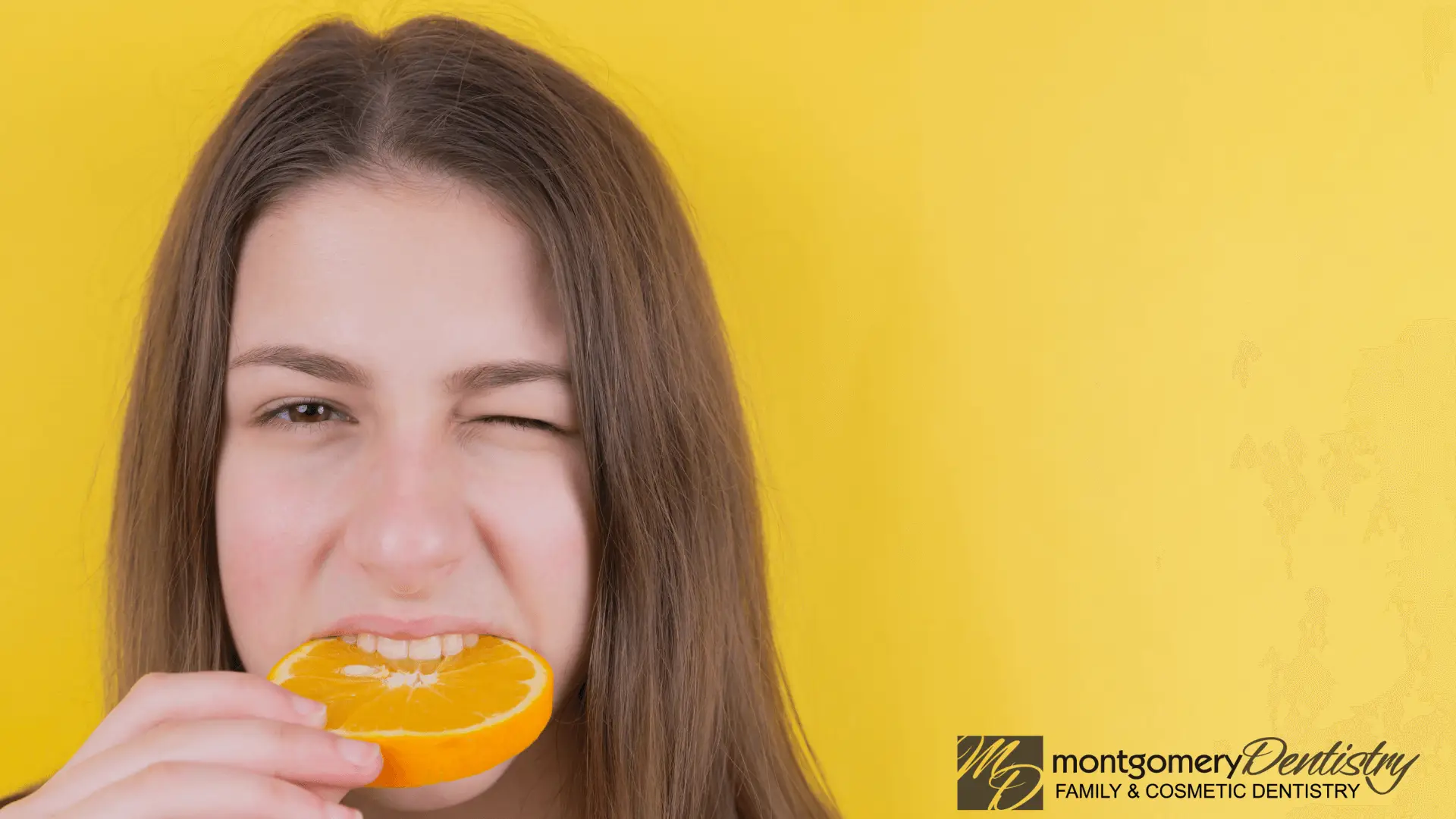Have you ever heard the saying, “you are what you eat” when it comes to a healthy diet? If this is true, then your health starts where your eating starts: your mouth. Oral health is oftentimes a great indicator of your overall health and when it comes to eating, your teeth reign supreme.
Just as there are good and bad foods for our body, there are also good and bad foods for your teeth and sometimes those that are good for your body are not the best for your teeth! While a good oral hygiene routine is important, avoiding certain foods and increasing nutrient-rich foods can help keep your teeth healthy long term.
5 Bad Foods for Your Teeth
Candy
Candy being bad for your teeth shouldn’t come as much of a surprise. However, there are some candies that are worse than others! For example, sweets like jelly beans, lollipops, caramels, and hard candies stay in your mouth longer thus making it more difficult for saliva to wash away the sugar.
If you have a major sweet tooth, stick with sugar-free candies or chocolates which you can chew and wash away quickly. Speaking of washing away, be sure to drink lots of water after eating candy to help prevent tooth decay!
Citrus Fruits
While citrus fruits are great for a healthy diet, they aren’t the best food for your teeth. Fruits like oranges, lemons, and grapefruits have large amounts of vitamin C but they also have large amounts of acid that can erode your teeth’s enamel. As your enamel wears away, your teeth become much more vulnerable to bacteria and decay.
The key to citrus fruits is moderation! They are a great source of vitamins and antioxidants, so you shouldn’t eliminate them from your diet. Instead, try to stay aware of how much acid you are taking in and, just like with candy, drink water afterward to limit how long your teeth are exposed.
Bread & Potato Chips
When it comes to food bad for your teeth, though potato chips may not seem like much of a surprise, the reality is that bread is bad for your teeth for the same reasons. When you chew starchy foods like bread and potato chips, your saliva breaks down the starches into sugars which then produce acid that can erode your teeth’s enamel.
Research shows the risk of tooth decay is increased by the tendency of these foods to become a paste-like substance that sticks between your teeth prolonging vulnerability. How can you help prevent the longevity of your teeth’s exposure? You guessed it…drinking water! Flossing is also a great way to make sure there is no residue in between your teeth.
Pasta Sauce
If citrus fruits are bad for your teeth because of acid, and candies, bread, and potato chips are bad for your teeth because of sugars, then it should come as no surprise that pasta sauce is not good for your teeth! Tomatoes are part of a healthy diet, but they are also very acidic, and if you remember, foods high in acid can erode your enamel.
Pasta sauce increases a tomato’s impact on your teeth because it both contains sugars in itself and is also put over pasta, which carries the same sugary impact as bread. Did you know that many popular pasta sauce brands can contain anywhere from 6.5 to 10.1 grams of sugar per serving? With this in mind, consider switching out your red sauce with an olive-oil drizzle every once in a while!
Dried Fruit
Before you set aside your favorite candies for the healthier option of dried fruit, you should know that these snacks can be bad for your teeth. Dried apricots, cranberries, dates, and other dried fruits are a great source of nutrients and antioxidants, but they are also very sticky.
Similar to candy, dried fruits have a high sugar content and easily stick to your teeth. Sugary and sticky combined together becomes a major contributor to tooth decay. So should you avoid dried fruit? No, but just like citrus fruits, moderation is important and so is your water intake to help wash away any sticky sugars.
Bonus: Bad Beverages for Your Teeth
5 Good Foods for Your Teeth
Cheese
If you’re looking for good food for your teeth, there’s no better place to start than cheese! It is one of the best foods you can eat to strengthen your teeth and protect them from cavities.
Why is it good? Cheese is low in sugar, high in minerals like calcium and phosphate, and contains a protein called casein. The calcium in cheese is important for maintaining bone density in your mouth and the phosphate it contains helps maintain a balanced pH thus fighting the effects of acid. If you aren’t familiar with casein, it is a protein found in many dairy products that directly defends your teeth’s enamel.
Even the act of eating cheese is good for your teeth! As you chew cheese, your saliva production actually increases, which helps in washing away bacteria in your mouth. However, while it is a good food for your teeth, cheese should not replace your oral health routine or your regular dental visits!
Leafy Greens
Unlike foods like citrus fruit that are good for some parts of your body and bad for others, leafy greens are great for your whole body’s health including your teeth! Spinach, lettuce, and kale are good foods for your teeth because they are examples of superfoods.
What is a superfood and how does that help your teeth? Putting it simply, superfoods are foods that contain a very high nutritional density with very few calories. Nutrients found in leafy greens like calcium, folic acid, antioxidants, and multiple vitamins and minerals help protect your teeth and gums from bacteria.
Fish
Salmon, tuna, sardines, mackerel, and other fatty fish are good for your teeth as they provide high amounts of vitamin D and omega-3’s. Did you know that approximately 42% of Americans have a vitamin D deficiency? Vitamin D helps your body absorb calcium and phosphate, and therefore is an important nutrient for your teeth to remain strong.
If you are not familiar with omega-3’s, they are fatty acids that have many health benefits including prevention of heart disease and stroke. Omega-3’s found in fatty fish can help lower your risk of gum disease by calming inflammation and infections in your mouth. So next time you’re in the grocery store, take a look at their fish selection to add to your meal rotation.
Nuts
If you want a healthy snack that is also good for your teeth, nuts are a great option! Packed with vitamins and minerals, nuts have all kinds of health benefits for your teeth. The crunchy nature of nuts is also beneficial as the movement of your mouth increases salivation and can dislodge plaque and bacteria.
What kind of nuts is best? Almonds are a great source of protein and calcium that benefit your gums and teeth. Peanuts contain large amounts of calcium and vitamin D and cashews are known to cause your mouth to salivate. Walnuts possess a wealth of benefits including vitamins E and B6, fiber, iron, zinc, potassium, and magnesium just to name a few.
Shiitake Mushrooms
Shiitake mushrooms pack a punch in both flavor and in the fight against tooth decay. First discovered in China and cultivated in 1100 AD, the shiitake mushroom is now the most common type of mushroom and is studied in-depth for its oral health benefits.
Having antibacterial and antimicrobial properties, shiitake mushrooms help prevent gum disease and tooth decay. Unique to the shiitake mushroom is a poly-saccharide called lentinan that contains immune boosting properties. Lentinan is also shown to kill bacteria that is damaging to your teeth while leaving the good bacteria unaffected. Shiitake mushrooms can be eaten raw, grilled, or thrown in a stir fry so adding this good food for your teeth to your diet is simple!
Bonus: Good Beverages for Your Teeth
About the Author
-

Dr. Jay L. Robertson
Dr. Jay Robertson joined our practice in July 2008. He is from Montgomery and is a graduate of Saint James School, Birmingham-Southern College, and the University of Alabama, Birmingham School of Dentistry. He is a member of the American Dental Association, the Alabama Dental Association and the Academy of General Dentistry.
Dr. Robertson and his wife Jennifer have four children, John Campbell, Julian, Lowe, and Ansley.
Dr. Robertson serves on the board of the Montgomery Quarterback Club and is a member of the First United Methodist Church of Montgomery. When not at work, Dr. Robertson enjoys all things sports, including Auburn, golf, and his children’s various sports.
